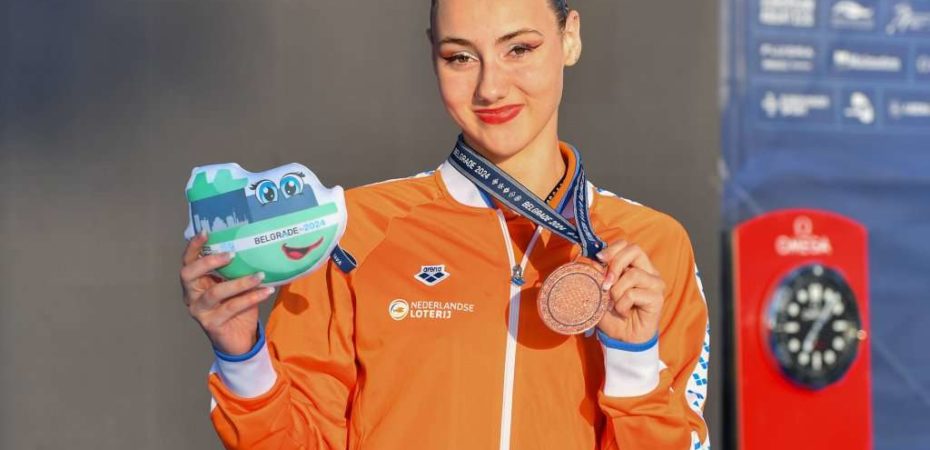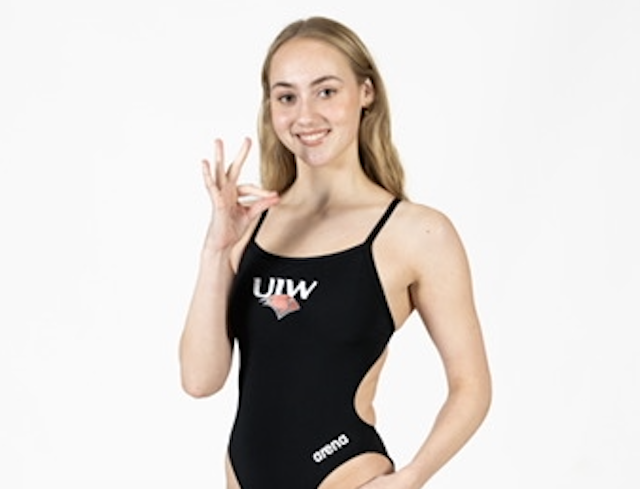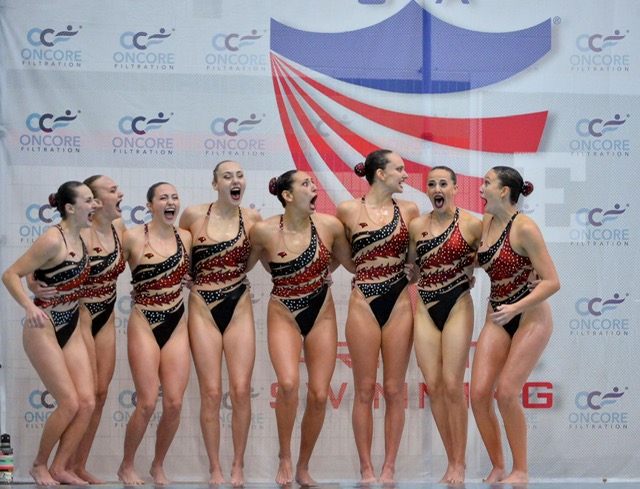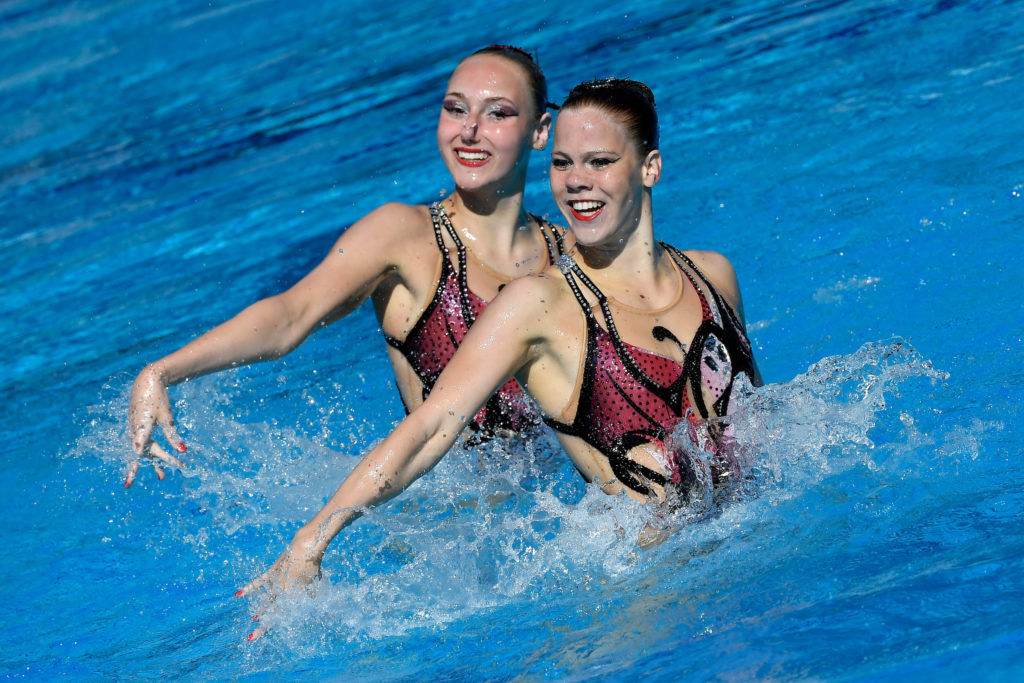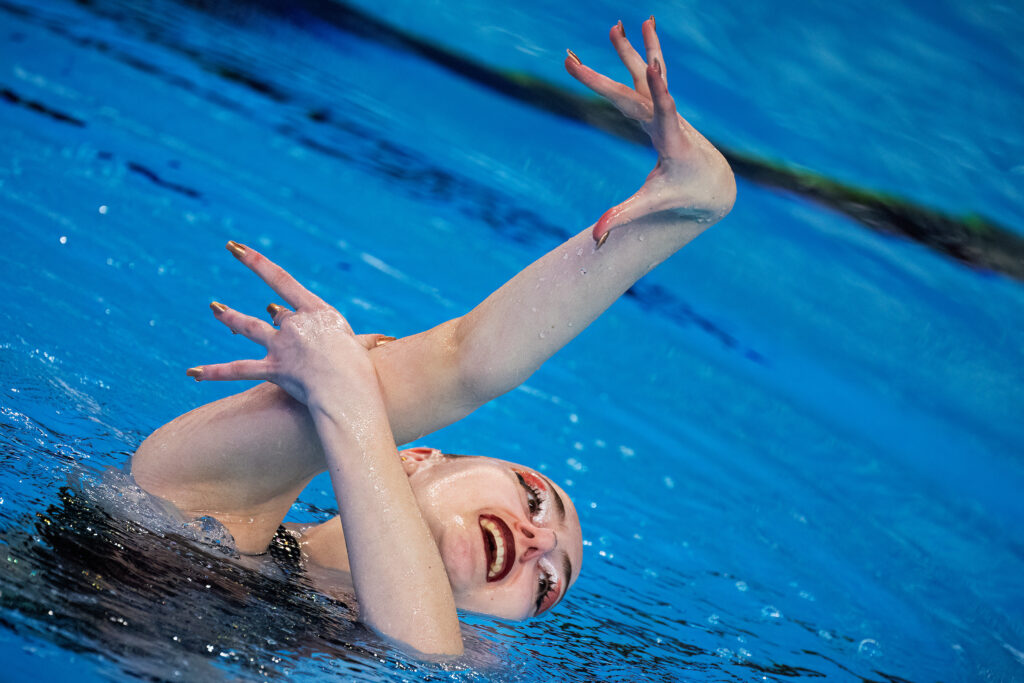In the United States, collegiate artistic swimming provides a unique path for athletes to work towards a university degree while also continuing to swim competitively. The 2025 Collegiate National Championship featured 13 collegiate teams, five varsity and eight club, with several current and former elite-level athletes from the U.S. and abroad among the more than 100 competitors.
Stanford University, The Ohio State University, and the University of the Incarnate Word (UIW) house the nation’s top varsity artistic swimming programs— many former elite-level athletes have gone onto swimming for these colleges after finishing their time on a national team. For others, though, collegiate artistic swimming is or was not the final chapter in their competitive careers.
In this four-part series, hear from Marloes Steenbeek (NED), Jacklyn Luu (USA), Nour Shamala (EGY), and Nikki Dzurko (USA) about their experiences following the collegiate artistic swimming path before coming back to swimming on the international stage.
Marloes Steenbeek of the Netherlands is a rising sophomore at the University of the Incarnate Word in San Antonio, Texas. Steenbeek is a three-time European Championships medalist, two-time World Junior medalist, and two-time European Junior medalist.
During her first season at UIW, Steenbeek became the Collegiate National Champion in solo, and helped her team to a second-place finish in the overall standings. She most recently finished seventh in free solo and ninth in technical solo at the 2025 World Championships in Singapore.
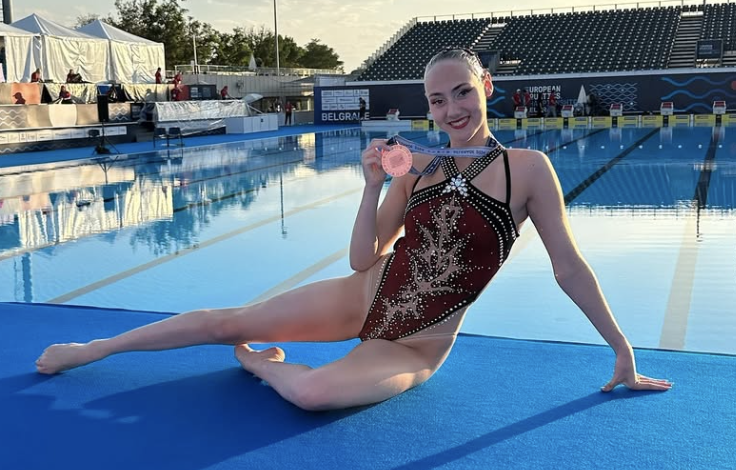
Inside Synchro: Why did you decide to go to the United States for university?
Marloes Steenbeek: I was the reserve of the duet with Noortje and Bregje [de Brouwer], and I was doing solo. [My coach] Esther [Jaumà] told me about the possibility to go to the U.S., because a lot of her former swimmers went to the U.S. to study and do synchro. She thought it would maybe be a nice experience for me, a good change. Esther asked Andrea [Fuentes] to help us and send emails out for me, and then everything just started rolling.
IS: Were you already interested in UIW before you joined?
MS: I had actually no idea what schools there were. I was in the CC of Andrea’s emails that she sent to the coaches of the schools, and then I was looking them up. But before that, I had no idea. UIW was really fast with responding to me, giving possibilities to look at scholarships and meeting up with them.
IS: What made you choose UIW in the end?
MS: Like I said, [UIW was] very fast with responding to me, giving me information and offering a scholarship. I already was pretty late to the whole process — it was May when I signed with the school, and normally it’s way earlier in the year. The team seemed very nice too, I knew Abby [Remmers] and Paige [Areizaga] from the U.S. national team— they were competing in the “Robots” routine while I was also competing elite. So, I had never even been on campus, but I decided to go there. I was like, “Okay, I’m just gonna find out. And if I don’t like it, then I’ll see what I do, but I just wanna try it.”
IS: How did your first year go?
MS: In the beginning I struggled a little bit with how I should be in the team. Because I’m not used to it — I’ve only been swimming solo and duet for the past eight years. But the team started growing on me very fast. I could reach out to them whenever I wanted, or they would come to me, so I felt very supported. I think we did very good as a team— we just tried to stay positive the whole time. We are all very competitive, but that’s what makes us aim for the best. We [also] had a lot of fun at practice, so it was like a combination.
It was really nice to experience so many motivated people around me, the positive energy that people have in this country, and [the] laughs that we had. It’s helped me a lot. I’m not used to having those in the Netherlands so much. Mostly because there, it was more serious, there was only three of us at training and it was more just work, work, work, with the duet aiming for the Olympics and all.
IS: It sounds like it was indeed a good change for you. Would you say collegiate synchro has helped you find motivation or passion again?
MS: Absolutely. It was really nice and I’m very happy that I went. It makes me look at synchro differently again. I’m loving the sport more again.
IS: Did you always know you wanted to come back to elite?
MS: It was always the plan to continue swimming for the Netherlands. And Esther also talked with Alyson, the coach at UIW, a lot about it during the season. Coach Alyson really helped me during Thanksgiving break, going to practice with me because I had to do some extra trainings from Esther. They were talking a lot about doing some programs for me just to say a little bit more on the international level, so it wouldn’t be too hard when I did go back.
IS: What’s the main difference, in your experience, between collegiate synchro and elite synchro?
MS: We’re training a lot less, only 20 hours a week. Then, I do gym and cardio next to that, because we cannot do more in the pool— it’s not allowed by the NCAA [the non-profit association that regulates collegiate sports]. It’s also really nice to see a lot of the Olympians at the pool and the competitions. And to see that they are probably enjoying the sport more as well, in a team that’s less competitive and more fun.
There’s school too, obviously. I’m studying interior design, so there’s a lot of modeling and drawings that take a long, long time, especially if you’re a perfectionist. Some girls in my class were just all together, staying up the whole night to finish a project, but I have to wake up at 5:00 a.m. for our practices.
Sometimes it’s hard to do all that. I don’t feel like I can do my best every day, but we have a sign at the pool that says something like, “Always give your 100% every day. Even if you only can give 30%, but if that’s your 100% of the day, then that’s good.” So I already know that, even though I’m very, very tired, I am just gonna do my best and it will be fine. And there’s no other pressure behind that.
IS: What’s the most important takeaway from your collegiate experience that you’re carrying with you now into the elite world?
MS: I’ve improved a lot socially, with finding myself more and finding more ways to express myself. Because you’re with so many people [in college], you cannot just be closed-off. You have to be expressive, in a way, or tell the team how you feel, if something is wrong. Now that I’m here in the Netherlands, I feel like I’m using that expressiveness more with Esther, too.
Sometimes I get mad because it’s just frustrating if something doesn’t go well a few times. Now, I can actually say, “I’m sorry, I’m trying really hard, but I’m just having trouble with it.” Before, I would never say something like that. I would always just be quiet. But I feel like if you are more expressive, you can understand your coach better too. And the coach understands me better as well— it’s improved our communication a lot.
IS: How has the transition been back to elite, ahead of the European and World Championships this summer?
MS: Of course, I trained a lot more than in the U.S. It changed a little bit every day, but it was more or less around 33 hours [per week]. So it was a lot, but it had to be done.
I did not really have much time for solo during the [collegiate] season, so we just went with something that I could execute well in that time. Then I had to raise the difficulty a lot after the season was over. Even when I got back to the Netherlands, we changed a lot of things, and I think we raised the DD by six or seven points.
I wanted to do much more, but there was so little time. I felt like my conditioning of course had lowered a little bit, so I had to work a lot on that. Especially with the technical solo for Singapore, 40 seconds under the water was a lot!
IS: What are some of your goals going forward?
MS: My goals are just to swim good: good execution, good artistic impression. I’m trying to work on it a lot. I hope to still have good years with the UIW team, and we can maybe become national champions. I hope so, it would be fun. And I’m just happy to study next to it— I really want to finish that too.
I don’t know when, because [the] Los Angeles [Olympic Games] are of course coming. In the elite world, my goal is LA, and if not LA, probably [20]32, if I want to. But because of LA, I will probably have to do a little gap year from school to prepare for the Olympics.
Responses have been edited for length and clarity.
ARTICLE BY MARI FLORES
Cover photo: European Aquatics
If you’ve enjoyed our coverage, please consider donating to Inside Synchro! Any amount helps us run the site and travel costs to cover meets during the season.

